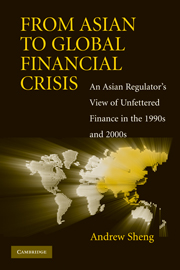 From Asian to Global Financial Crisis
From Asian to Global Financial Crisis Book contents
- Frontmatter
- Contents
- List of Figures
- List of Tables
- Acknowledgements
- Introduction
- 1 Things Fall Apart
- 2 Japan and the Asian Crisis
- 3 The Beam in Our Eyes
- 4 Banking: The Weakest Link
- 5 Washington Consensus and the IMF
- 6 Thailand: The Karma of Globalization
- 7 South Korea: Strong Body, Weak Heart
- 8 Malaysia: The Country That Went Its Own Way
- 9 Indonesia: From Economic to Political Crisis
- 10 Hong Kong: Unusual Times Need Unusual Action
- 11 China: Rise of the Dragon
- 12 From Crisis to Integration
- 13 The New World of Financial Engineering
- 14 What's Wrong with Financial Regulation?
- 15 The Global Financial Meltdown
- 16 A Crisis of Governance
- From Asian to Global Crisis: Chronology of Notable Events
- Abbreviations and Acronyms
- Bibliography
- Index
6 - Thailand: The Karma of Globalization
Published online by Cambridge University Press: 05 June 2012
- Frontmatter
- Contents
- List of Figures
- List of Tables
- Acknowledgements
- Introduction
- 1 Things Fall Apart
- 2 Japan and the Asian Crisis
- 3 The Beam in Our Eyes
- 4 Banking: The Weakest Link
- 5 Washington Consensus and the IMF
- 6 Thailand: The Karma of Globalization
- 7 South Korea: Strong Body, Weak Heart
- 8 Malaysia: The Country That Went Its Own Way
- 9 Indonesia: From Economic to Political Crisis
- 10 Hong Kong: Unusual Times Need Unusual Action
- 11 China: Rise of the Dragon
- 12 From Crisis to Integration
- 13 The New World of Financial Engineering
- 14 What's Wrong with Financial Regulation?
- 15 The Global Financial Meltdown
- 16 A Crisis of Governance
- From Asian to Global Crisis: Chronology of Notable Events
- Abbreviations and Acronyms
- Bibliography
- Index
Summary
Don't try to catch a tiger with bare hands.
~ Thai proverbThe law of karma states that each and everyone will reap the fruit of his karma, either good or bad, in due time, with certainty and in its entirety. The predominantly Buddhist Kingdom of Thailand was where the Asian crisis officially began on 2 July 1997. Amongst the worst crisis-hit economies, Thailand is perhaps the prime example of a middle-income country that enjoyed and then succumbed to the vicissitudes of globalization, where strong and effective institutional governance in economic and political life is crucial to sustainable prosperity. It was the karma of globalization that could not be avoided by any emerging country, whether good or bad.
In hindsight, Thailand got into trouble mainly because, first, on the macroeconomic side, it suffered from incompatible policy targets. In particular, in the period leading up to the crisis, it was confronted with an increasingly difficult dilemma of the Impossible Trinity, that is, how to reconcile having a near-fixed exchange rate, free capital movements and an independent monetary policy all at the same time. Second, on the structural side, Thailand suffered from an inadequate risk management regime that led to excessive private sector debts, which fuelled a massive stock and property bubble. Both were perhaps signs of a flawed decision process, a consequence of bad politics.
- Type
- Chapter
- Information
- From Asian to Global Financial CrisisAn Asian Regulator's View of Unfettered Finance in the 1990s and 2000s, pp. 126 - 158Publisher: Cambridge University PressPrint publication year: 2009


